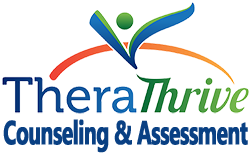
skilled depression treatment
Depression Therapy
Depression can affect you in many ways, and may impact numerous aspects of your life. Or it might hurt your functioning in general, making it a scary, yet a necessary thing to explore and seek help for.
Depression can feel different for everyone. Depending on your personal experience, depression may impact your body too, including yet not limited to feeling heavy, foggy, disconnected, empty, numb, slow, and apathetic.
Sometimes you might struggle with depression throughout your day, or maybe only during certain times of the day. You might also experience depression just a few times during the year.
There are many different types of depressive experiences, including existential depression and grief/loss. Our professionals at TheraThrive are experienced in treatment of depression, including existential concerns, and we are here to support you.
Symptoms of Depression
- Feelings of guilt, worthlessness, and helplessness
- Difficulty concentrating, remembering details, and indecisiveness
- Insomnia, waking up early or throughout the night, sleeping too much
- Irritability
- Feeling fatigued and tired often
- Digestive difficulties
- Loss of interest in things that once made you happy or you enjoyed
- Overeating, appetite loss
- Hopelessness
- Constantly feeling sad, anxious, “empty”
- Body aches, pains, headaches
- Suicidal thoughts
You are not alone.
We Offer Experience in Depression Treatment
Regardless of how often or how intense you may experience depression, you deserve support and to not feel alone in your experience–that’s why we’re here.
Depression and Neurodivergent People
If you are neurodivergent, your depression might feel different than it may for others. Many neurodivergent and highly sensitive people (of all ages) experience depression in the form of feeling different and isolated in their experiences. At times, you may even have a sense of shame or stigma about yourself, falling into the belief that something is wrong with you. If you (or your child) is neurodivergent and/or highly sensitive, you also may experience grief/loss and existential depression more often.
Types of Depression We Treat
- Major Depressive Disorder
- Persistent Depressive Disorder
- Existential Depression
- Postpartum Depression
- Grief and Bereavement
- Seasonal Affective Disorder
- Bipolar Disorder
- Adjustment Disorder with depressed mood
Here at TheraThrive, we understand the strength that depression may take on, including the intense feeling of overwhelm and fear that may exist if you feel trapped with the depression you are living with.
We know how to help with Overexcitabilities (OE’s), intensities, and sensitivities, and we will support you in finding coping skills, strategies, and skills to manage how much your depression may impact you.
Existential Depression
Existential depression often occurs when a person confronts the struggles of life, including death, freedom, powerlessness, loneliness, and meaning. Many people who experience existential depression feel stuck within the harsh realities that come with life, and struggle to find control and identify choices they can make to manage some of these realities.
Sometimes neurodivergent individuals may fixate or dwell on their meaning in life, or feel powerless to change some of the hardships of life, therefore questioning their worth and their value. Existential depression may also be experienced by focusing on death and struggle with coming to terms with the temporality of life, or even feel hopeless with what you can do with the limited time you have (this can even occur in young children).
Sometimes these experiences can lead us to indifference and inability to motivate ourselves and accomplish goals we may have. No one should struggle alone with existential depression; we care, we’re here, and we truly get the depth that may come with existential depression.
Grief and Loss
Grief and loss are hardships that include depressive symptoms. These can cause an increase of overall depressive symptoms as well. While grief is generally associated with the loss or death of someone (or something) we care for, here at TheraThrive we also recognize that grief can also occur in other ways throughout your life.
Grief and loss might include losing a loved one or a pet, and can include: rejection, coming to terms with a disability or new limitations, break-ups, divorce, separation, other relationship changes, job loss, being laid off, foreclosure on a house, moving, change of environment, being misunderstood by others, being misread by others, being stereo-typed or labeled often, and mass crisis or emergencies.
Grief and Loss in Neurodivergent People
If you are neurodivergent, your intensities, OEs, and/or sensitivities may impact how you recognize losses or your experiences may be at a heightened level. Therefore you may experience sadness regarding a loss before others do. Or, you may even experience sadness regarding a loss when others do not even recognize a type of loss has occurred.
If you are neurodivergent, you may struggle with masking and managing social experiences with others. You may also grieve for shorter or longer periods of time than others around you. Your grief may also seem more intense than those around you as well. Shortened, lengthened or or heightened intensity of grief can increase the risk that you might also feel alone in your experience and may elevate the severity of depression that may also come.
In addition, if you are neurodivergent, you might grieve about your own inability to be neurotypical, or to fit-in with others, and in this way you may struggle with loss of ever feeling normal or similar to others. This is a common sense of loss that we work with here at TheraThrive. One thing we know is that even though you may grieve the loss of connections, we know that the person you are is someone to appreciate, value, and love.
We Support You With Skill and Experience
When supporting you with grief and loss, we are aware of how deeply grief can hit you, and impact your day-to-day functioning. We understand the need to process loss and to have the loss be recognized by others. We know that your grief is not something to move on from, and instead is something you can learn to carry with you into the future with greater ease and a lighter feeling than before.
We help you to gain the muscle, tools, strengths, and skills to hold grief and to move with it, rather than deny it or struggle to move forward at all. We understand grief and loss and we are here to help you.
Find A Therapist
Documents
